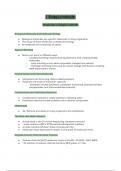1 Biological molecules
Introduction to biological molecules
Biological Molecules and Molecular Biology
● Biological molecules are specific chemicals in living organisms.
● The study of these molecules is molecular biology.
● All molecules are composed of atoms.
Types of Bonding
● Atoms can bond in different ways:
○ Covalent bonding involves sharing electrons, and creating stable
molecules.
○ Ionic bonding occurs when oppositely charged ions attract.
○ Hydrogen bonding forms due to uneven charge distribution, creating
weak electrostatic bonds.
Polymerisation and Macromolecules
● Monomers can form long chains called polymers.
● Polymers are made of monomer subunits.
○ Examples include polythene, polyesters (industrial), polysaccharides,
polypeptides, and polynucleotides (natural).
Condensation and Hydrolysis Reactions
● Condensation reactions create polymers, releasing water.
● Hydrolysis reactions break polymers into subunits using water.
Metabolism
● All chemical processes in living organisms are metabolism.
The Mole and Molar Solution
● A mole (mol) is the SI unit for measuring substance amount.
● 1 mole contains 6.022 x 10^23 particles (Avogadro's number).
● A molar solution (M) has 1 mole of solute per litre.
● Molecular mass expressed in grams is one gram of molecular mass.
Example Sodium Chloride Molar Solution
● Sodium chloride (NaCl) molecular mass is Na (23) + Cl (35.5) = NaCl (58.5).
● 1 M solution of sodium chloride contains 58.5 grams in 1 litre.
, Atoms, Isotopes and the formation of ions
Atoms
● Atoms are the smallest independent units of chemical elements.
● They consist of a nucleus containing protons, neutrons and electrons orbiting
the nucleus.
○ Subatomic particles
■ Neutrons In the nucleus, no electrical charge, and the same
mass as protons.
■ Protons In the nucleus, a positive charge, the same mass as
neutrons.
■ Electrons Orbit in shells, negligible mass, negatively charged,
determine an atom's chemical properties.
● In atoms, the number of protons equals electrons, resulting in no overall
charge.
○ Key terms Atomic number (proton count) and mass number (proton and
neutron count).
Isotopes
● Isotopes have the same number of protons but different numbers of neutrons.
● They share the same chemical properties but vary in mass.
● Identified by different mass numbers.
Formation of Ions
● Atoms can become ions by gaining or losing electrons.
● Loss of an electron results in a positive ion (e.g., calcium ion Ca^2+).
● Gaining an electron leads to a negative ion (e.g., chloride ion Cl^-2).
● Ions can consist of multiple atom types (e.g., sulphate ion SO₄²⁻).
Carbohydrates monosaccharides
Carbohydrates
● Carbohydrates are carbon molecules combined with water.
● They vary in size, from small to large molecules.
Carbon's Role in Life
● Carbon atoms readily form bonds with other carbon atoms, creating long
chains.
● These chains serve as backbones for attaching other atoms.





